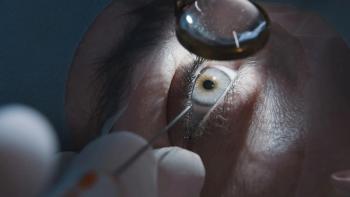
Optometrists in co-management relationships help each focus on area of interest in practice
Even limited co-management relationships may benefit optometrists as they allow them to focus on areas of patient care in which they are passionate.
"Co-managing ophthalmology patients brings a potential for added revenue, but it can bring other rewards as well because it is an educational process, it expands patient variety, and it improves patient outcomes. Therefore, I truly believe co-management is a win-win-win situation," said Dr. Lavery, TLC Eye Care and Laser Centers of Michigan, Jackson and Battle Creek.
Even optometrists who are happy without being involved in co-management may find limited co-management relationships beneficial as they allow them to focus on the areas of patient care about which they are passionate, he said.
The optometrist also must feel comfortable contacting the ophthalmologist at any time about any patient concerns. "The ophthalmologist should be your 'phone-a-friend' whose number you keep on speed dial. You should feel at ease calling with any questions and recognize there is no such thing as giving your co-managing partner too much information," Dr. Lavery said.
Co-managing cataract patients
Although the growth of laser vision probably was the greatest stimulus for the development of co-management relationships, many other opportunities exist. Dr. Lavery focused on the role of the optometrist in co-managing cataract surgery patients.
He noted that with premium intraocular lenses (IOLs), cataract surgery has merged into refractive surgery, so the preoperative management of cataract surgery patients is the same as that extended to refractive surgery patients.
For example, contact lens wear needs to be discontinued far enough in advance of the surgery so that axial length and keratometry measurements will be accurate for precise IOL power calculation. In addition, external and ocular surface disease conditions that can affect quality of vision need to be diagnosed and managed. Among these, dry eye disease and blepharitis are very common, but are often missed.
"Patients should be ready for their procedure when they come to the surgeon," Dr. Lavery continued. "A delay due to the presence of a condition that was not adequately managed can undermine the co-management relationship. Be sure you treat lid margin disease and tear dysfunction before sending a patient in for cataract consultation."
Other relatively common conditions include map-dot-fingerprint dystrophy, pterygium, and Salzmann's nodular degeneration. Decisions about performing corneal scraping to remove erosions in eyes with map-dot-fingerprint dystrophy can be challenging because its role as a culprit in vision degradation may be unclear.
Dr. Lavery suggested that a rigid gas permeable contact lens trial may provide the answer. "If the patient picks up two or three lines of vision, then you may want to remove the map-dot- fingerprint dystrophy and wait until the patient has healed before sending him or her on to the surgeon," he said.
With pterygium, he recommended that a growing lesion be removed. However, if it appears stable, any astigmatism it is causing may be neutralized using a toric IOL.
Corneal nodules in a patient with Salzmann's nodular degeneration can be removed using a crescent blade, but the procedure should be done several weeks before surgery.
Newsletter
Want more insights like this? Subscribe to Optometry Times and get clinical pearls and practice tips delivered straight to your inbox.













































